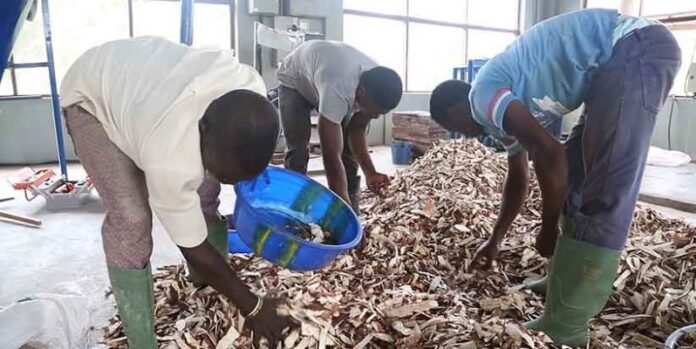When Alice Nyirasagamba, 46, took a leap of faith and started Akanoze Nyamiyaga Ltd in 2018, her business approach was to processes cassava into flour for cooking and baking being another business idea she was trying out after unsuccessfully tried her hand in other ventures.
Her success in the tuber value addition would later expose her to the High-Quality Cassava Peels (HQCP) technology developed by the International Institute of Tropical Agriculture (IITA) and partners that made her change the narrative about cassava waste by turning it into revenue and job creation especially for fellow women.
In this, her company has been able to add a processing unit to its existing operations to produce and sell HQCP mash to poultry farmers.
“We used to produce a lot of cassava peels which we could just throw away and at some point finding a proper location to dispose them could be a challenge but now the technology has opened another way of income and prober waste management,” said the resident of Nyamiyaga Sector in Kamonyi District in the Southern Province of Rwanda where cassava is produced in abundance.
Perfect animal feed ingredient
According to IITA, the HQCP mash is a perfect animal feed ingredient, which can be fed to livestock without further processing or mixed with other animal feeds to feed animals.
In 2019, Nyirasagamba got training from the global institute under the rural-urban nexus: Establishing a nutrient loop to improve city region food system resilience (RUNRES) project.
The training was on recycling cassava peelings into animal feeds.
Today, the same farmers who sell cassava and the peels to the factory buy the animal feeds as the firm is securing its raw materials through supply deals with cassava farmers and cooperatives, said Nyirasagamba.
Nyamiyaga Akanoze is now one of the renowned rural-based, women-owned agro-processing companies in Rwanda whose success the agriprenuer attributes to persistence and continuous trials for perfection.
Production
“We use between 12 and 15 tonnes of fresh cassava daily in the first processing unit, and waste generated is processed into animal feed ingredients in the newly constructed unit,” Nyirasagamba said.
As the demand for the HQCP mash increases, the business faces significant challenges affecting its production capacity.
“We started buying 500 kilograms of peels from farmers daily, but today we are buying about four tonnes of them per day. We have a machine that turns the peels into livestock feed livestock species, namely poultry, cows, pigs, goats, and others,” she continued.
“Our activities help protect the environment as these peels were scattered on the ground and would cause environmental degradation because some farmers used to burn them, and its smoke harms the environment and human health.”
Besides the environmental advantages, this circular economy enterprise has already employed eight casual staff which include five men and three women and has generated about Rwf25 million (US$25,000).









[…] Credit: Source link […]
Am interested in this work can u come and invest in Nigeria’ or can u give me invitation to come ur country to learn.
Comments are closed.